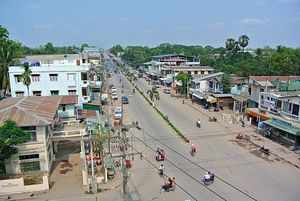Ethnic Karen rebels in eastern Myanmar claim to have seized control of part of the town of Myawaddy on the country’s border with Thailand, inflicting another serious debacle on the military junta.
On Friday, according to a BBC report, the Karen National Union (KNU) announced that it had accepted the surrender of a battalion based in the town of Thanganyinaung, about 10 kilometers west of Myawaddy. It added that over the weekend, the Karen forces “have been negotiating with the last remaining battalion inside Myawaddy, which has apparently agreed to surrender.”
In a statement posted to its social media channels, the KNU reported that 477 military personnel surrendered in Thanganyinaung, in addition to 140 family members. It accompanied the statement with photos of the large cache of weapons that it claimed to have seized in the attack.
While the final negotiated surrender of the garrison in Myawaddy proper has not yet been confirmed, it may just be a matter of time. The Myanmar junta has reportedly requested that Thailand allow government officials, military personnel, and civil servants to cross into Thailand via the Thai-Myanmar Friendship Bridge, which connects Myawaddy to the Thai town of Mae Sot.
The junta’s embassy in Bangkok also reportedly contacted the Thai Ministry of Foreign Affairs yesterday, requesting permission to land several ATR 72-600 charter flights in Mae Sot over the next 72 hours. The purpose of the flights, according to a copy of the letter from the embassy, is to pick up “special passengers and cargo” from Mae Sot, presumably soldiers and junta officials who surrendered to the KNU, and fly them back to Yangon.
The reported surrenders come after weeks of attacks by ethnic Karen insurgents, who have besieged junta positions across the east of the state, in conjunction with allied anti-junta People’s Defense Forces formed since the coup. The increased fighting has been increasingly disruptive to trade via Myawaddy-Mae Sot, the largest of the six official border crossings between Myanmar and Thailand. According to figures from the junta’s Ministry of Commerce cited by Myanmar Now, the value of trade through Myawaddy between April 2023 and February 2024 fell by more than 40 percent compared to the same period the year before, from $1.87 billion to $1.085 billion.
The KNU, which has been fighting for autonomy from the central state in some form or another since Myanmar’s independence in 1948, has staunchly opposed the military takeover of February 2021. Since then, it has provided safe harbor for dissidents fleeing military crackdowns on anti-coup activities across the country. In the intervening three years, the KNU has provided military training to many of these urban refugees, some of whom have joined PDF units that have taken part in KNU attacks against the junta.
As Jonathan Head of the BBC noted in his report, the balance of power in Karen State has “recently shifted in favor of the opposition,” after a Karen Border Guard Force aligned with the military administration cut its ties with the junta. In January, Col. Saw Chit Thu, the former leader of the insurgent Democratic Karen Buddhist Army who controls a territory along the Thai border that includes the notorious organized crime hub of Shwe Kokko, said that it would no longer obey orders from Naypyidaw. There is no indication that the group, which has reportedly set to rebrand itself the Karen National Army, will join the anti-junta resistance, but its break has weakened the military’s presence and influence in Karen State.
The impending fall of Myawaddy, which would leave the KNU in control of a supermajority of Karen State, would be another significant defeat for the military junta. It follows a string of reversals for the generals, first in northern Shan State, where a coordinated offensive by the Three Brotherhood Alliance of ethnic armed groups scored rapid gains against junta positions, seizing the strategically important Kokang region from a military-aligned Border Guard Force in January. In recent months, the military has suffered significant losses in Rakhine State in the country’s west to the Arakan Army.
Like last week’s kamikaze drone attack on Naypyidaw, the surrender of Myawaddy is the sort of defeat that the military would likely shrug off were it an isolated incident. But the accumulation of military defeats over the past year raises the question of how, and in what form, it can survive over the longer term. The most hopeful outcome from the junta’s perspective is probably to enact a strategic retreat from weakly-held peripheral areas and consolidate its control over a rump of central Myanmar. Either way, the junta’s goal of “pacifying” the country and staging a return to a civilianized form of military government via stage-managed elections appears more fantastical than ever.
































